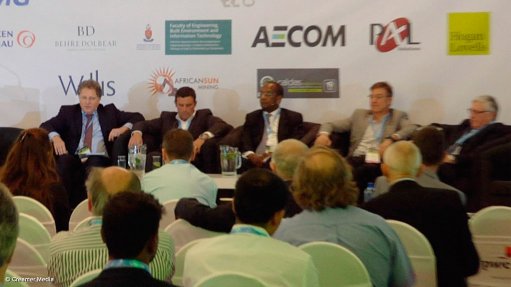
Investor panel at Joburg Indaba
Photo by: Creamer Media
JOHANNESBURG (miningweekly.com) – Mining company executives have made a ton of money, fund managers have done fine and investment bankers have made a killing but the only people who have not made money are the shareholders – and the reason is the skewed way in which mining top brass are incentivised.
That message came over loudly and clearly at the Joburg Indaba from a panel made up of Regarding Capital Management chairperson Piet Viljoen, Public Investment Corporation listed investments executive head Fidelis Madavo, Allan Gray portfolio manager Sandy McGregor and Coronation Fund Managers analyst Henk Groenewald.
Mining top brass came in for a hammering during the heart-to-heart, which was chaired by Anglo American nonexecutive director Jim Rutherford, himself a former Capital Group mining analyst.
CEOs were lambasted for inept capital allocation, with the 440 attendees hearing that Anglo American would now have a nigh debt-free balance sheet had it not allocated capital to the Minas Rio iron-ore project in Brazil.
Thrashed was the short termism of incentivisation for what is a very long-term industry.
Share price incentives were given a firm thumbs down and questions were asked about the absence of incentives around operational metrics like lower unit costs and life-of-mine extensions.
Instead, boards were incentivising CEOs to achieve rapid share price increases, fund managers had quarterly return incentives and investment bankers just wanted to do deals.
As a result, operational executives had become soft targets and boards were failing to provide guidance on proper capital allocation.
Instead, directors were rubber stamping in order to make companies bigger and thereby boost share prices so that they and executive management could make a lot of money.
Postulated was that CEOs should not be allowed to sell their shares for several years after leaving the company.
Rutherford set the scene by pointing out that 2015 would go down globally as the fifth consecutive year of the under performance of mining shares relative to the broader equity market.
While that was not quite unprecedented in the history of the mining industry, it was getting pretty close to being so.
With commodity prices well down from their highs and little optimism that the market would see any sustained rebound in the short term, the mining industry itself had entered the downturn with stretched balance sheets, which was forcing companies to dispose of assets.
As far as commodity prices were concerned, the ‘stronger for longer‘ thesis had given way to what many now saw as the ‘weaker forever’ phase.